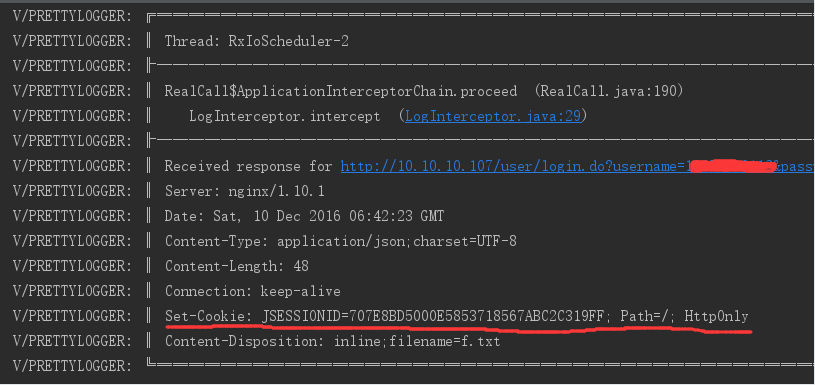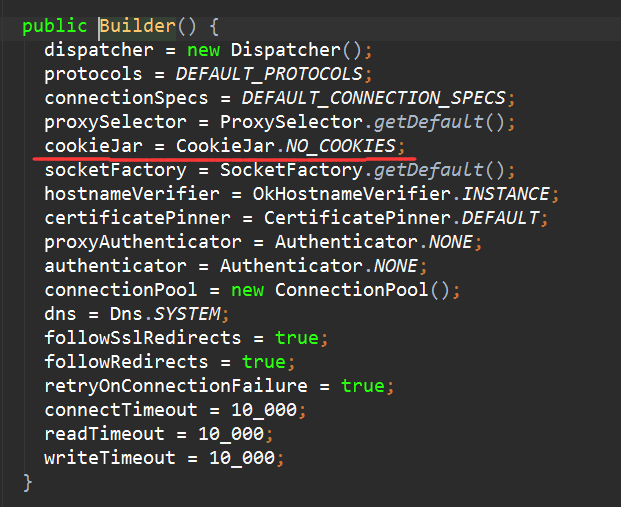移动端项目和网站还是多多少少的区别的,拿这个用户登陆过期验证这个流程来说吧,一般的网站是不会做处理的,浏览器访问的时候会自动带有Cookie的,移动端这样处理就不行的,他是不会保存Cookie的,所以我们在做项目的时候,一般来说,服务器的哥们都会在登陆成功之后给你返回一个叫做Token的东西,其实就是验证授权,这个东西就像是SessionId,但是本质又不一样(目前能力理解)。这样,你用移动端每一次网络请求都把这个Token当做公共参数传递给服务器,这时候服务器会根据这个唯一的Token值拿到在redis缓存服务器中的缓存数据,然后给你提示。
这是一般的流程,我私下的一个项目,我没有去考虑这一点(外包,你懂得),所以出现了一个问题,就是我请求后台,后台出现了异常,说是Session过期,你妹的,我才刚登陆的成功啊,一下就反应过来这是为什么,因为后台的哥们用的是默认的Session,这个东西需要我们移动端自己去保持Cookie的。
我的项目用的是Retrofit+Rxjava,如何用Retrofit在客户端保持Cookie呢?
对于服务器做Session缓存的接口,移动端请求会返回一个Cookie的东西,可以打印看一下
我们需要保持的就是这个东东
先看一下okhttp的源码:
所以Retrofit可以利用okhttp本身是支持Cookie保持的特点来用设置okhttp作为Retrofit的底层请求框架,也可以自定义,根据情况而定,代码如下:
一、PersistentCookieStore 用来储存OkHttpCookies
public class PersistentCookieStore {
private static final String LOG_TAG = "PersistentCookieStore";
private static final String COOKIE_PREFS = "Cookies_Prefs";
private final Map<String, ConcurrentHashMap<String, Cookie>> cookies;
private final SharedPreferences cookiePrefs;
public PersistentCookieStore(Context context) {
cookiePrefs = context.getSharedPreferences(COOKIE_PREFS, 0);
cookies = new HashMap<>();
//将持久化的cookies缓存到内存中 即map cookies
Map<String, ?> prefsMap = cookiePrefs.getAll();
for (Map.Entry<String, ?> entry : prefsMap.entrySet()) {
String[] cookieNames = StringUtil.split((String) entry.getValue());
for (String name : cookieNames) {
String encodedCookie = cookiePrefs.getString(name, null);
if (encodedCookie != null) {
Cookie decodedCookie = decodeCookie(encodedCookie);
if (decodedCookie != null) {
if (!cookies.containsKey(entry.getKey())) {
cookies.put(entry.getKey(), new ConcurrentHashMap<String, Cookie>());
}
cookies.get(entry.getKey()).put(name, decodedCookie);
}
}
}
}
}
protected String getCookieToken(Cookie cookie) {
return cookie.name() + "@" + cookie.domain();
}
public void add(HttpUrl url, Cookie cookie) {
String name = getCookieToken(cookie);
//将cookies缓存到内存中 如果缓存过期 就重置此cookie
if (!cookie.persistent()) {
if (!cookies.containsKey(url.host())) {
cookies.put(url.host(), new ConcurrentHashMap<String, Cookie>());
}
cookies.get(url.host()).put(name, cookie);
} else {
if (cookies.containsKey(url.host())) {
cookies.get(url.host()).remove(name);
}
}
//讲cookies持久化到本地
SharedPreferences.Editor prefsWriter = cookiePrefs.edit();
prefsWriter.putString(url.host(), TextUtils.join(",", cookies.get(url.host()).keySet()));
prefsWriter.putString(name, encodeCookie(new OkHttpCookies(cookie)));
prefsWriter.apply();
}
public List<Cookie> get(HttpUrl url) {
ArrayList<Cookie> ret = new ArrayList<>();
if (cookies.containsKey(url.host()))
ret.addAll(cookies.get(url.host()).values());
return ret;
}
public boolean removeAll() {
SharedPreferences.Editor prefsWriter = cookiePrefs.edit();
prefsWriter.clear();
prefsWriter.apply();
cookies.clear();
return true;
}
public boolean remove(HttpUrl url, Cookie cookie) {
String name = getCookieToken(cookie);
if (cookies.containsKey(url.host()) && cookies.get(url.host()).containsKey(name)) {
cookies.get(url.host()).remove(name);
SharedPreferences.Editor prefsWriter = cookiePrefs.edit();
if (cookiePrefs.contains(name)) {
prefsWriter.remove(name);
}
prefsWriter.putString(url.host(), TextUtils.join(",", cookies.get(url.host()).keySet()));
prefsWriter.apply();
return true;
} else {
return false;
}
}
public List<Cookie> getCookies() {
ArrayList<Cookie> ret = new ArrayList<>();
for (String key : cookies.keySet())
ret.addAll(cookies.get(key).values());
return ret;
}
/**
* cookies 序列化成 string
*
* @param cookie 要序列化的cookie
* @return 序列化之后的string
*/
protected String encodeCookie(OkHttpCookies cookie) {
if (cookie == null)
return null;
ByteArrayOutputStream os = new ByteArrayOutputStream();
try {
ObjectOutputStream outputStream = new ObjectOutputStream(os);
outputStream.writeObject(cookie);
} catch (IOException e) {
Log.d(LOG_TAG, "IOException in encodeCookie", e);
return null;
}
return byteArrayToHexString(os.toByteArray());
}
/**
* 将字符串反序列化成cookies
*
* @param cookieString cookies string
* @return cookie object
*/
protected Cookie decodeCookie(String cookieString) {
byte[] bytes = hexStringToByteArray(cookieString);
ByteArrayInputStream byteArrayInputStream = new ByteArrayInputStream(bytes);
Cookie cookie = null;
try {
ObjectInputStream objectInputStream = new ObjectInputStream(byteArrayInputStream);
cookie = ((OkHttpCookies) objectInputStream.readObject()).getCookies();
} catch (IOException e) {
Log.d(LOG_TAG, "IOException in decodeCookie", e);
} catch (ClassNotFoundException e) {
Log.d(LOG_TAG, "ClassNotFoundException in decodeCookie", e);
}
return cookie;
}
/**
* 二进制数组转十六进制字符串
*
* @param bytes byte array to be converted
* @return string containing hex values
*/
protected String byteArrayToHexString(byte[] bytes) {
StringBuilder sb = new StringBuilder(bytes.length * 2);
for (byte element : bytes) {
int v = element & 0xff;
if (v < 16) {
sb.append('0');
}
sb.append(Integer.toHexString(v));
}
return sb.toString().toUpperCase(Locale.US);
}
/**
* 十六进制字符串转二进制数组
*
* @param hexString string of hex-encoded values
* @return decoded byte array
*/
protected byte[] hexStringToByteArray(String hexString) {
int len = hexString.length();
byte[] data = new byte[len / 2];
for (int i = 0; i < len; i += 2) {
data[i / 2] = (byte) ((Character.digit(hexString.charAt(i), 16) << 4) + Character.digit(hexString.charAt(i + 1), 16));
}
return data;
}
}
public class OkHttpCookies implements Serializable {
private transient final Cookie cookies;
private transient Cookie clientCookies;
public OkHttpCookies(Cookie cookies) {
this.cookies = cookies;
}
public Cookie getCookies() {
Cookie bestCookies = cookies;
if (clientCookies != null) {
bestCookies = clientCookies;
}
return bestCookies;
}
private void writeObject(ObjectOutputStream out) throws IOException {
out.writeObject(cookies.name());
out.writeObject(cookies.value());
out.writeLong(cookies.expiresAt());
out.writeObject(cookies.domain());
out.writeObject(cookies.path());
out.writeBoolean(cookies.secure());
out.writeBoolean(cookies.httpOnly());
out.writeBoolean(cookies.hostOnly());
out.writeBoolean(cookies.persistent());
}
private void readObject(ObjectInputStream in) throws IOException, ClassNotFoundException {
String name = (String) in.readObject();
String value = (String) in.readObject();
long expiresAt = in.readLong();
String domain = (String) in.readObject();
String path = (String) in.readObject();
boolean secure = in.readBoolean();
boolean httpOnly = in.readBoolean();
boolean hostOnly = in.readBoolean();
boolean persistent = in.readBoolean();
Cookie.Builder builder = new Cookie.Builder();
builder = builder.name(name);
builder = builder.value(value);
builder = builder.expiresAt(expiresAt);
builder = hostOnly ? builder.hostOnlyDomain(domain) : builder.domain(domain);
builder = builder.path(path);
builder = secure ? builder.secure() : builder;
builder = httpOnly ? builder.httpOnly() : builder;
clientCookies =builder.build();
}
}
三、实现有一个自定义的CookieManger来管理cookies,实现以K-V结构获取set,getCookier
public class CookieManger implements CookieJar {
private static Context mContext;
private static PersistentCookieStore cookieStore;
public CookieManger(Context context) {
mContext = context;
if (cookieStore == null ) {
cookieStore = new PersistentCookieStore(mContext);
}
}
@Override
public void saveFromResponse(HttpUrl url, List<Cookie> cookies) {
if (cookies != null && cookies.size() > 0) {
for (Cookie item : cookies) {
cookieStore.add(url, item);
}
}
}
@Override
public List<Cookie> loadForRequest(HttpUrl url) {
List<Cookie> cookies =cookieStore.get(url);
return cookies;
}
}
四、Okhttp使用
public static RetrofitAPI Retrofit(Context mContext) {
mHttpClient = new OkHttpClient().newBuilder()
.connectTimeout(10, TimeUnit.SECONDS)//设置超时时间
.readTimeout(10, TimeUnit.SECONDS)//设置读取超时时间
.writeTimeout(10, TimeUnit.SECONDS)//设置写入超时时间
.addInterceptor(new LogInterceptor())//拦截器
.cookieJar(new CookieManger(mContext))//cookie保持
.build();
if (retrofitAPI == null) {
retrofitAPI = new Retrofit.Builder()
.baseUrl("http://10.10.10.107/")
.addConverterFactory(GsonConverterFactory.create())
.addCallAdapterFactory(RxJavaCallAdapterFactory.create())
.client(mHttpClient)
.build()
.create(RetrofitAPI.class);
}
return retrofitAPI;
}
五、持久化Cookie开源库,用了之后想骂人,为什么如此简单!
老样子,开源库嘛,肯定第一步就是引入依赖
compile 'com.github.franmontiel:PersistentCookieJar:v1.0.0'如何使用:
ClearableCookieJar cookieJar =
new PersistentCookieJar(new SetCookieCache(), new SharedPrefsCookiePersistor(context));
OkHttpClient okHttpClient = new OkHttpClient.Builder()
.cookieJar(cookieJar)
.build();
相关文章:
开源库Git连接:
https://github.com/franmontiel/PersistentCookieJar
小白大哥的博客写的很精髓,每次看都会有不同的灵感,没事也向他请教一些思路问题,真的很棒,分享一下。

























 3万+
3万+

 被折叠的 条评论
为什么被折叠?
被折叠的 条评论
为什么被折叠?










